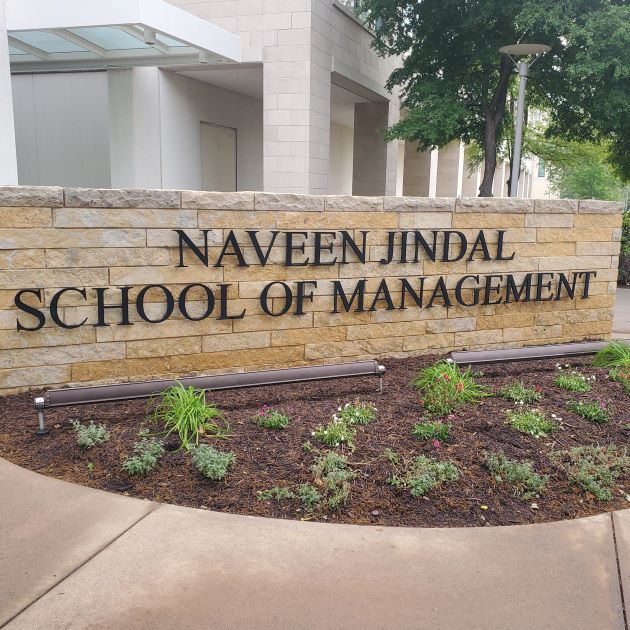
The Naveen Jindal School of Management hosted the 19th Big XII+ MIS Research Symposium, a forum for faculty and graduate students in the fields of information systems and business analytics to share their research ideas and progress.
![[descriptive alternative text]](/jindal/files/2023/03/2023_big_xii_mis_confernece_630x473.jpg)
The March 24-26 symposium was chaired by three faculty members in the Jindal School’s Information Systems Area: Gaurav Shekhar, assistant dean for graduate programs and assistant professor; Dr. Harpreet Singh, an associate professor and Dr. Zhe (James) Zhang, an associate professor.
Shekhar, director of the MS in Business Analytics Flex and Online programs at the Jindal School, said he and his fellow chairs were thrilled by the opportunity to host a conference that brought together more than 130 faculty members and students from 22 universities. Nine corporate partners supported the event. Some of the top sponsors were Appian, PNC Bank, Prospect Press, UiPath and Credit Union of Texas.
The symposium featured 33 papers that focused on management issues and applications of artificial intelligence, deep machine-learning and text-mining, data analytics, behavioral economics, technical/analytical work, and interdisciplinary theories.
Dr. Vijay Mookerjee, a Charles and Nancy Davidson Chair and PhD area coordinator of the IS programs at the Jindal School, was a keynote speaker. He discussed what changes can be expected in the near future.
“In the early 2000s, e-commerce platforms did a great job of organizing electronic retail but did not deliver the promise of flat friction-free commerce,” he said. “The monolithic value chain of (digital) platform(s) is unraveling. Firms and consumers will connect to neutral, open networks using apps, similar to the way we use cars on a highway. Open networks for digital commerce will profoundly disrupt current e-commerce in the next 5-7 years.”
Dr. Sumit Sarkar, a Charles and Nancy Davidson Chair and Director of PhD Programs was the opening keynote speaker. His talk was aligned with the goal of the Big XII+ meetings, which is to provide a forum for PhD students and junior faculty to share their research in a relatively informal setting.
“Specifically, it was targeted to help PhD students and junior faculty chart their career paths,” Sarkar said after the conference. “For PhD students, the focus was on strategies to survive, and thrive, in such programs, and the importance of establishing their independent research identities. For junior faculty, the focus was more on navigating the various challenges faced by graduates when they start their research career as a faculty member, such as collaboration with new colleagues, time-management given the new responsibilities on teaching and service fronts.”

Dr. Jordana George, a clinical assistant professor of information systems in the Mays Business School at Texas A&M University, is a regular attendee of the Big XII symposium and was a presenter. She spoke about “An Alternative Approach to Measuring Business Strategy in Information Systems Research.”
After the event, George said symposium remains one of her favorite conferences and that the UTD team “did a spectacular job.”
“The intimate size encourages new friendships and connections while the developmental value cannot be understated,” she said. “When I finished my PhD and went on the market, I already knew many of the people at schools I was considering because of the symposium, and my first A-journal paper started out as a student conference paper at Big XII. It is our honor and pleasure to host the event at Texas A&M in 2024. We just hope we can favorably compare to the outstanding event hosted by UTD this year.”
“It was terrific to have UTD host the Big XII+ MIS Symposium again,” said Dr. Ramesh Sharda, vice dean of research at Oklahoma State University, after the event. “From all the feedback I have received, the meeting was an outstanding experience for the doctoral students and faculty from all the schools in the area. Thanks to the college and department administration as well as the three co-chairs of the meeting for running an excellent symposium.”
Dr. Deepak Khazanchi from the University of Nebraska at Omaha moderated a panel discussion about the latest industry research. After the event, he said that UTD did “a wonderful job” organizing the event.
“Once a year the Big XII+ MIS Research Symposium offers an opportunity for new and upcoming (researchers) to learn from senior researchers, leaders and experts from the private sector,” he said. “UTD did a wonderful job of organizing this symposium.”
Shekhar said the conference successfully fulfilled its goal of providing networking opportunities among Big XII+ faculty members and PhD students, learning about ongoing research at Big XII+ schools, identifying potential areas for research collaboration, identifying potential areas for joint funding proposals, providing opportunities for graduating PhD students to interact with faculty members from potential hiring institutions and providing a collegial environment to advance MIS research and teaching.
“The fact that PhD students, who were in the early stages of their research, were able to get top class feedback from scholars from different institutions was what impressed me the most,” he said. “This symposium blended the academic and industry streams together to discuss what is most current in the area of IS research.”
Singh said that the conference excelled at exploring a wide range of topics within the realm of MIS.
“It encouraged attendees to broaden their understanding of emerging technologies, data analytics, cybersecurity, artificial intelligence and more,” he said.
Zhang was impressed by all the featured keynote speeches, panel discussions, and research presentations that highlighted cutting-edge research and best practices.
“It was a melting pot of scholars from many of the top institutions,” he said.





